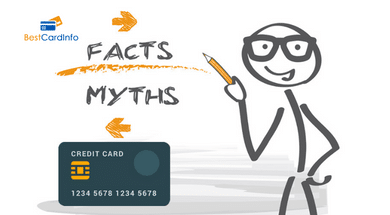Keeping yourself up to date with what is going on and thoroughly knowing a product you are using is very important, especially with a tool like a credit card. Having a credit card, no doubt makes your life easier however not knowing everything about this plastic money can lead you to a debt spiral. That does not, however, imply that you should believe everything you hear without verifying its truthfulness. Credit cards can be a useful and effective financial tool that can help you establish a credit history if utilized properly. They can also serve as an excellent tool for buying regular items. Although credit cards provide advantages, there are a lot of myths about them. There are numerous myths concerning credit cards that are circulating, and we’ll explain whether they’re real or false.

Myths about credit cards:
Myth 1: A card that charges a yearly or renewal fee should be avoided:
Obtaining a credit card with no joining or renewal charges might very well appear attractive, but this is not very often the finest option. Nil yearly or renewal charge credit cards, also widely recognized as free credit cards, commonly do not provides incredible rebates and reward programs like most credit cards that have a joining and renewal fee; rather, they provide their cardholders with the bare essentials. A premium credit card is a wise choice if you really want a credit card that benefits you for your transactions and provides you with outstanding offers. Although some cards have yearly fees, the advantages they offer more than makeup for them. If you still choose against having a credit card with a yearly fee, take into consideration that several credit cards will eliminate the charge if you spend more than a specified limit.
Myth 2: It is enough to make the required minimum payment:
Making the minimum amount sufficient is a persistent myth in society if only that was the truth. If you obey the rules, paying off the balance in full is preferable to making the minimum payment that the issuers ask of you. Making the bare minimum payment is okay, but it is not the best course of action. Paying minimal payments merely sets you up to pay more during the subsequent billing cycle because interest will be charged to the entire balance due.
Myth 3: It isn’t an issue if I delay payment as long as I entirely pay off my credit card debt:
It indeed matters. Even if consumers fully pay off their credit cards, not making a repayment or paying it after the due date will damage their credit score. If they consistently fall behind on their repayments, this might not be considered to be a good credit habit. Users will also be charged interest and a fine for late settlement. If it’s difficult for you to remember to repay your bills on time and on schedule, set an alarm on your cellphone or planner. Most institutions even offer the auto-debit feature to help you settle your bills on schedule.
Myth 4: Your credit rating suffers if you have a lot of credit cards:
Possessing many credit cards is not a terrible thing; in fact, some people will argue that owning cards for various purposes is beneficial. Managing many credit cards might be advantageous if you are consistent and disciplined enough to do so. Considering that each credit card is special and offers a distinct set of advantages.
Myth 5: Once you’ve completely paid off a credit card, you should close it:
Yet another widespread misconception that has the potential to negatively impact someone is the notion that closing a credit card with a bad repayment record can raise their credit rating. The truth is that closing a credit card reduces your available credit limit and damages your credit history. Each provider and lender will look at your credit rating and payment history to evaluate if you are a safe option or not, so having a longer credit history can be helpful in a variety of ways.
Bottom line:
As much financial flexibility as a credit card offers, it’s crucial to utilize them properly. Because of this, users of credit cards should place more emphasis on the things that really matter, such as making on-time payments, paying off their balance in full, maintaining a low credit utilization rate, etc., rather than believing misleading information about credit cards. Credit cards can be a terrific source of emergency funds and can really help you in building your credit score, but if you are not careful with the card, it might end up costing you a lot of money.
Additional read: Advantages And Disadvantages of Credit Card

